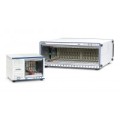PXI Chassis: The Backbone of a High-Performance Test System
In modern test and measurement environments, engineers demand high-speed, scalable, and modular solutions for automated testing. A PXI chassis serves as the foundation of a PXI-based system, offering high-performance backplane connectivity, seamless module integration, and superior data processing speeds. Whether in aerospace, telecommunications, automotive, or semiconductor testing, a PXI chassis ensures efficient, accurate, and reliable test execution.
Why Choose a PXI Chassis for Your Test System?
High-Speed Data Transfer for Fast Testing
The PXI backplane architecture enables rapid communication between modules, reducing test execution time and increasing throughput.
Scalable & Modular Design for Future Expansion
Multiple slot configurations allow for easy system upgrades, ensuring flexibility to meet evolving test requirements.
Seamless Integration with PXI Modules
Supports a wide range of instruments, including oscilloscopes, signal analyzers, and function generators, for comprehensive testing.
Compact & Space-Efficient for High-Density Testing
PXI chassis configurations provide a high channel density, reducing rack space requirements while maximizing functionality.
Optimized Cooling & Power Management
Advanced thermal management ensures consistent performance, preventing overheating and maintaining system stability.
High-Speed Data Transfer for Fast Testing
The PXI backplane architecture enables rapid communication between modules, reducing test execution time and increasing throughput.
Scalable & Modular Design for Future Expansion
Multiple slot configurations allow for easy system upgrades, ensuring flexibility to meet evolving test requirements.
Seamless Integration with PXI Modules
Supports a wide range of instruments, including oscilloscopes, signal analyzers, and function generators, for comprehensive testing.
Compact & Space-Efficient for High-Density Testing
PXI chassis configurations provide a high channel density, reducing rack space requirements while maximizing functionality.
Optimized Cooling & Power Management
Advanced thermal management ensures consistent performance, preventing overheating and maintaining system stability.
Applications of PXI Chassis-Based Test Systems
Aerospace & Defense – Radar, avionics, and electronic warfare testing.
Semiconductor Testing – High-speed digital and analog validation.
Automotive Industry – ECU, sensor, and vehicle network diagnostics.
Telecommunications – RF and wireless communication system testing.
Industrial Automation – Control system and power electronics evaluation.
Aerospace & Defense – Radar, avionics, and electronic warfare testing.
Semiconductor Testing – High-speed digital and analog validation.
Automotive Industry – ECU, sensor, and vehicle network diagnostics.
Telecommunications – RF and wireless communication system testing.
Industrial Automation – Control system and power electronics evaluation.
Find the Right PXI Chassis for Your Needs!
For engineers and manufacturers, a PXI chassis provides the foundation for fast, modular, and high-precision testing, ensuring seamless integration and long-term reliability.
Contact us today to explore our PXI chassis solutions and enhance your test automation setup!
Frequently Asked Questions About PXI Chassis
1. What is a PXI Chassis?
A PXI Chassis is the mechanical and electrical foundation of any PXI system. It provides power, cooling, and communication pathways for PXI Controllers and PXI Modules. The chassis ensures synchronized data transfers and timing, which is critical for automated test systems.
2. What role does a PXI Controller play?
A PXI Controller acts as the brain of the PXI platform. It can be either an embedded controller or an external PC connected via a PXI Remote Control Module. The controller manages data flow and system operation, allowing you to run test applications on PXI Test Modules installed in the chassis.
3. How do I select the right PXI Chassis?
When choosing a PXI Chassis, consider:
Slot count: How many PXI Modules you plan to install.
Power supply capacity: Ensure the chassis can support the power demands of your PXI Test Modules.
Cooling: Efficient airflow is essential for system reliability.
Timing & synchronization: Look for chassis with low-jitter clock sources if precise timing is required.
Slot count: How many PXI Modules you plan to install.
Power supply capacity: Ensure the chassis can support the power demands of your PXI Test Modules.
Cooling: Efficient airflow is essential for system reliability.
Timing & synchronization: Look for chassis with low-jitter clock sources if precise timing is required.
4. What types of PXI Test Modules are available?
The PXI platform supports a wide range of PXI Test Modules, including:
RF and microwave signal generators and analyzers
Digital I/O and pattern generators
Switches (matrix and multiplexer)
Data acquisition (DAQ) modules
Oscilloscopes and digitizers
RF and microwave signal generators and analyzers
Digital I/O and pattern generators
Switches (matrix and multiplexer)
Data acquisition (DAQ) modules
Oscilloscopes and digitizers
These modules allow you to create a highly customized and scalable automated test system.













